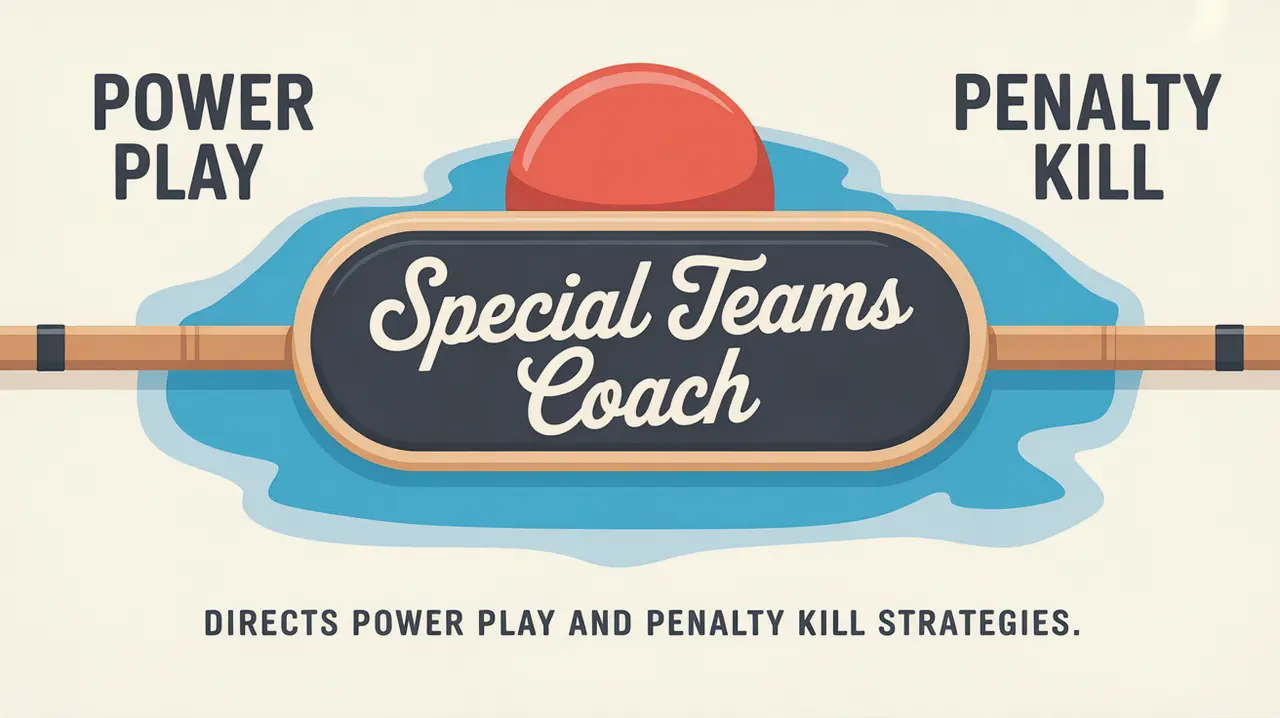Jim’s Intro to the Special Teams Coach
Hi folks, Jim here, the only commentator who once tried to diagram a power play on live TV and accidentally drew a game of tic-tac-toe.
What is a special teams coach?
A special teams coach is a specialized member of the coaching staff responsible for designing, coordinating, and executing a team’s power play and penalty kill strategies. Since games are often decided on special teams, this coach’s job is to maximize scoring opportunities with the man advantage and minimize damage when shorthanded.
While head, offensive, and defensive coaches focus on broader systems, the special teams coach lives in the margins. These are the critical moments when discipline, structure, and creativity intersect.
How does it work?
The special teams coach shapes the game through tactical precision, player specialization, and relentless situational preparation:
Power Play Strategy
- The special teams coach designs power play formations, such as 1-3-1 or umbrella setups, tailored to the team’s personnel.
- They emphasize puck movement, quick decisions, shooting lanes, and player positioning to create high-percentage scoring chances.
- Adjustments are made depending on the opponent’s penalty kill tendencies.
Penalty Kill Systems
- On the flip side, the coach develops penalty kill formations (box, diamond, wedge-plus-one) and teaches players how to pressure intelligently, block shots, and clear the zone.
- They train players to anticipate passing lanes, maintain stick discipline, and read offensive setups in real time.
Player Roles and Responsibilities
- Special teams coaches identify specialists: puck movers and shooters for the power play, disruptors and smart defenders for the penalty kill.
- They work closely with these players to refine instincts, positioning, and timing for their specific roles.
Video and Scouting Work
- They analyze opponent tendencies, for example where power play quarterbacks like to shoot, which lanes are exploited, and how teams react to pressure.
- They prepare detailed counter-strategies, adjusting alignments and personnel to neutralize threats or exploit weaknesses.
Situational Drills
- In practice, the special teams coach runs focused, game-like drills, simulating different power play and penalty kill scenarios, including 5-on-3 advantages, delayed penalties, and end-of-game situations.
Common Situations Involving Special Teams Coaches
- Designing Power Play Formations: Choosing structure and personnel to fit the team’s strengths.
- Running Penalty Kill Drills: Teaching pressure angles, stick placement, and rebound control.
- Scouting Opponent Units: Adjusting tactics for different power play styles.
- Real-Time Adjustments: Tweaking formations mid-game if special teams are struggling.
- Preparing Specialists: Coaching players who thrive in unique man-advantage or disadvantage roles.
How do you make good decisions with it?
Great special teams coaches rely on analysis, adaptability, and precision.
- Match Strategy to Personnel: Build systems around what your players actually do best.
- Exploit Opponent Patterns: Adjust to neutralize their strengths or attack their gaps.
- Keep It Simple Under Pressure: Complex schemes break down when players panic.
- Communicate Roles Clearly: Everyone should know their lane and responsibility.
- Be Willing to Adjust Fast: Special teams windows are short; stubbornness costs goals.
How do you master it?
Mastering the special teams coach role requires deep tactical knowledge, sharp analytical skills, and strong teaching ability. Great special teams coaches constantly study trends, anticipate counters, and refine formations to keep opponents off balance. They also know how to turn repetition into instinct, so players execute under pressure without hesitation.
What does it look like when done right?
A great special teams coach builds a power play that moves the puck like clockwork, creating high-danger chances, while the penalty kill pressures smartly and clears efficiently, frustrating opponents. The team wins tight games because special teams tilt the balance their way.
Commentator’s Corner
Jim’s Take
Special teams coaches are like chess players in sudden death. One sharp move can flip the entire outcome.
Parent Tip
If your player gets time on special teams, remind them to treat it as a privilege and responsibility. These are the game-changing moments.
Player Tip
Special teams play earns trust fast. Mastering your role on the power play or penalty kill can secure ice time even if you’re not on the top line.
A Final Thought
The special teams coach is the tactical specialist who turns opportunities into goals and kills momentum for the other team. When mastered, the role blends strategy, adaptability, and precision, often becoming the deciding factor in close, competitive games.









